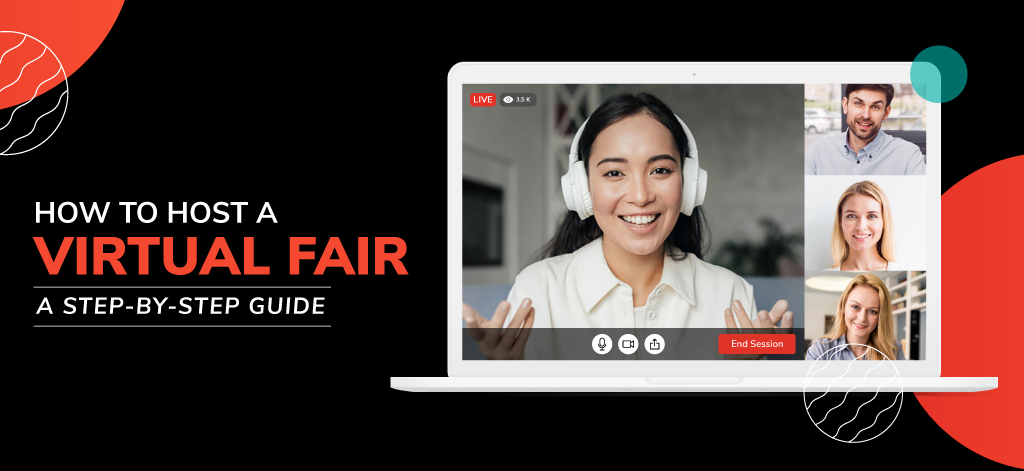Along with uncertainties, another thing that the past year brought was online events. Earlier it was our circumstances that made us host events online, later it was just our comfort. Owing to the numberless benefits that they come with, online events have now become the first preference of organizations across the globe. So even if things go back to normal, virtual events are staying longer. Even though the concept of hosting events with a virtual component is in trend these days, there are still a lot of organizations having some doubts regarding the same. They think that hosting a virtual event can never be advantageous. However, it is to know that even though an online event can never take over the impact of a physical event, the former is as rewarding as the latter.
What is a virtual event?
In an online event, people interact with each other in an online environment rather than coming together physically. Various examples of virtual events include virtual trade shows, virtual award shows, virtual expos, and many more. Like any other virtual program, a virtual fair is simply a fair that takes place online. In short, you can host any event virtually if you can think of hosting it physically. A virtual trade show uses specific technology and equipment such as laptops or mobile phones and stable internet connectivity.
What are the features of virtual fairs?
Due to their innovative structure, there are a lot of advantages that come with a virtual fair. If you’re one of those who are skeptical about hosting an online fair, here are some features to guide you through virtual shows-
Economically feasible
Virtual shows are highly pocket-friendly for both attendees and the hosts. While they allow the organizers to save the cost of the venue, decoration, logistics, the attendees save travel, registration and other expenses.
Time-saving
Apart from saving money, online shows save a lot of time. While it takes months of preparation and plans to conduct a physical fair, online fairs come with some convenience. But that doesn’t mean that they don’t need planning!
Sufficient audience reach
One considerable advantage that virtual trade shows come with is wider audience reach which increases the brand visibility and potential customer base. Owing to the latest technology that we have access to, getting in touch with the entire world is now possible.
Effortless access
Apart from target groups, there isn’t any other factor that can restrict the audience from attending an online show. No matter what part of the world you are in, you can join online events happening in any part of the world, given you have at least a smartphone and stable internet connectivity.
Live data and analytics
One advantage virtual trade shows have over in-person events is they allow live analytics regarding the audience’s engagement in the event. This data is crucial for the organizers and can help them know if they have met their virtual job fair objectives or not. It also acts as feedback and decides which factors need improvement in the next edition.
One-on-One interaction
The common myth people have regarding virtual shows is that virtual events don’t let you connect and interact with your fellow attendees. In fact, with online events, you can conveniently interact with fellow attendees, sponsors, and even the hosts.
Easy to navigate
Another noticeable feature that online fairs and shows have is easy navigation through the entire event. All you need to have is basic technical knowledge, and there you have the complete event- a click away.
Types of virtual fairs
Virtual Job Fairs
Also known as virtual career fairs, Virtual job fairs allow job seekers and employers to connect. They are an excellent platform for employers to meet job seekers, interview them, and make on-spot offers. Virtual career fairs allow people to connect with recruiters from all over the world at ease, something that wouldn’t have been possible with in-person job fairs.
Virtual Trade Fairs
A virtual trade show enables companies and manufacturers to exhibit goods and products. These online trade shows allow companies to reach a larger audience through a virtual trade show platform.
Virtual placement Fairs
Such online fairs allow university students to connect with recruiters from across the world. Just like traditional placement fairs, they help students build networks and find a suitable career choice for themselves.
Virtual Benefit Fairs
Virtual benefit fairs allow employers to seamlessly communicate and explain the benefits and policies to remote employees.
How to host a virtual fair?
Now that you have an idea about the meaning and prominent factors, let us dive deeper and have a look at how to host a virtual fair-
Strategize your virtual event
Have you ever heard of any event organized without planning? Even if you are organizing a birthday party, you need to plan a few things. The same goes with a virtual show; you need to take care of everything while planning one. Start with selecting an appropriate date and time, making sure you get maximum audience engagement and attendance. Consider everything you will need to make your plans a reality, be it resources, budget, the type of fair you will organize, and other specifications. After noting down your requirements, plan your budget carefully. Consider the price of your virtual event platform and other expenses.
Select a virtual fair platform
Proceed further with your event and select a virtual event platform that matches all your requirements. Select two-three virtual event solutions and compare their pricing structure and features and then opt for the one you think is the best of them all. The target group, engagement features, mobile optimization, security, analytics tools, and customization options are the few factors you need to consider while selecting a virtual career fair platform.
Set Up Virtual Booth
Like their physical counterparts, virtual trade fairs have virtual booths where people can seek information. For example, you can get job information if it is a virtual career fair and housing information at a virtual housing fair. Here people can also interact with the booth owners and build networks.
Reach out to sponsors
Now reach out to sponsors, exhibitors, and speakers and pitch what you can offer to them. While it’s not easy to get speakers and exhibitors on board, you would want to spend a good amount of time on it as it can make or break your event. Explain your objective and how it will be beneficial for them. Keep them informed about the number of audiences you’re expecting, along with your strategies to host and manage the event. Make sure you contact them after you have planned out everything so that if they put across any questions, you are ready with your answers.
Spread the word
Now that you’ve planned everything, it’s time to spread the word. Those who have been hosting events for a while now must be aware of the importance of promoting them. Discuss the media and strategies you will use for promotion with your team. You can use various promotional techniques and channels, all this while considering the scale of your event. Start with promoting the event in your circle. Send emailers, make appropriate use of your social media presence, and use billboards for promotions. If you are organizing the event on a larger scale and expecting a higher number of attendees, use newspapers, radio, and other media to spread the message.
Share relevant information with the attendees
Build the audience’s excitement by dropping some trailers a few days before the event. Send countdown mails to the registered accounts and remind them about the event. You can also plan some surprise elements, like a keynote session by some celebrity, so that a maximum number of attendees show up on the final day. Make sure you send all necessary details on the registered emails and don’t miss out on any information relevant to the audience. If it is a virtual job fair, ask your registered candidates to upload their resumes so that the employers have an idea about the candidate beforehand.
Time to get the feedback
Now that the event is over, it’s time for you to go through the analytics. This data will help you decide if you have met your virtual event objectives or not. You can also conclude which strategies worked for you and which ones need improvement. Take a follow-up with all the participants and exhibitors and ask for their feedback. You can send them feedback forms, surveys, or emails.
Final Word
Fairs have been in there since the time we can’t even recall. But as the term fair evolved, the concept behind it also grew. There are various kinds of fairs hosted these days, some of which we have discussed above. Due to the spread of Covid-19, technology has taken over physical events, including fairs. Now the new format that has become a part of our lives is virtual fairs.
To recap, virtual career fairs provide an excellent opportunity for companies to expand their reach and brand recognition. The flexibility, seamless process, and relatively lower costs make them an attractive option for organizers around the globe.
If you’re looking forward to hosting your virtual fair, contact Dreamcast and see your plans becoming a reality.



















